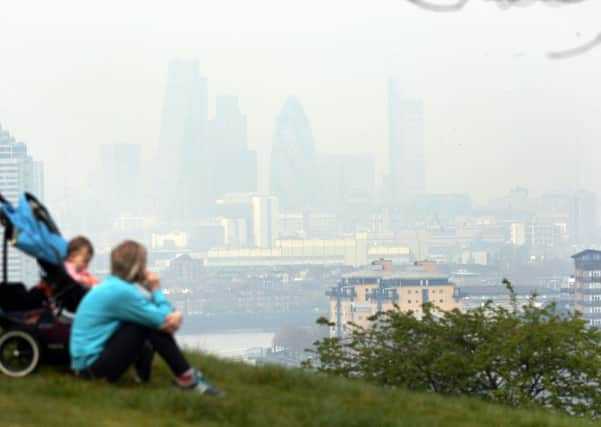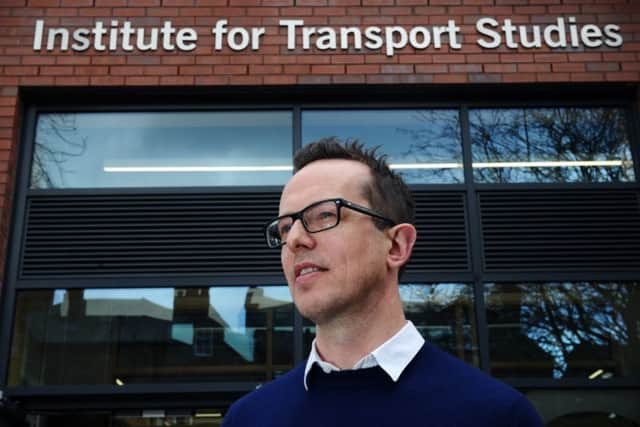Air pollution and our battle for cleaner air


Here in the UK we sometimes look aghast at pictures of people in China wearing protective masks as they trudge through its suffocating city streets shrouded by toxic smog.
But we aren’t immune from air pollution. True, we’ve come a long way from the deadly smogs that engulfed London back in the early 1950s claiming the lives of thousands of people.
Advertisement
Hide AdAdvertisement
Hide AdToday, our pollution is largely invisible but there is growing concern about the impact it is having on air quality.


Last month the Government came under renewed pressure to tackle the problem as MPs launched a new inquiry on the issue, while Ministers have also been told by the High Court they must publish new plans to tackle nitrogen dioxide pollution this month.
Dirty air doesn’t directly kill people but it’s estimated in the UK to contribute to the shortening of the lives of around 40,000 people a year, particularly those with heart or lung problems.
Air pollution in this country hasn’t improved significantly and there’s no doubt that it’s a problem and can exacerbate conditions like asthma and hay fever.
Advertisement
Hide AdAdvertisement
Hide AdDr James Tate, Associate Professor at the Institute for Transport Studies at the University of Leeds, says such health concerns are problematic. “The more people look into the impact of air quality on health and as health data becomes more widely available, more links are emerging all the time,” he says.


“The reason is that as more health and environmental evidence becomes available, stronger links are being found to things like dementia, children’s lung development and asthma.”
In Britain, air pollution has generally been dropping (with the exception of ammonia from farming). But despite the overall fall, in many of our big cities safe limits of nitrogen oxides (NOx) are still regularly breached.
Traffic hotspots are causing us to breach World Health Organisation emission levels and Leeds is one of a number of cities due to introduce charges on the dirtiest vehicles by the end of the decade to try and cut levels of air pollution.
Advertisement
Hide AdAdvertisement
Hide Ad“It’s bad in Leeds but we’re not at the level of London,” says Dr Tate. “Emission levels in London can easily be more than double the air quality standard, but in Leeds at a heavy traffic roadside location they are breaking air quality standards, too.”
There are other air quality ‘hotspots’ in Yorkshire. “It’s any street with heavy traffic that has high-sided buildings lining the streets so in Headingley, for instance, the levels are quite high.”
Areas of concern include swathes of Leeds city centre and also some spikes in less obvious places. “Pool-in-Wharfedale is really busy and that is breaking air quality standards at the moment,” says Dr Tate.
And air pollution isn’t only harming our health, it is having a “devastating impact” on UK wildflowers and some rural landscapes with the Yorkshire Dales among the worst-hit areas, according to conservation experts.
Advertisement
Hide AdAdvertisement
Hide AdNitrogen emissions from transport, power stations, farming and industry in the form of nitrogen oxides and ammonia are deposited back into the natural environment directly from the air, or in the rain, over-fertilising the soil.
Concerns about air pollution have been around for decades, but the issue has been thrust into the news over the past 12 months after the Government was told to by the High Court to clean up Britain’s air as soon as possible. This followed revelations that some car makers were found to be falsifying tests on car emissions.
Amid all this diesel cars have been portrayed as the villains of the piece and Dr Tate believes they are a big contributing factor.
“I was involved in some research back in 2010 showing that a brand new diesel car was as polluting as a 20-year-old diesel car for nitrogen dioxide. People thought this can’t be the case but we also linked the findings to trends in air quality levels and they weren’t getting better,” he says.
Advertisement
Hide AdAdvertisement
Hide Ad“In urban driving conditions there’s not much difference between a petrol and diesel car in terms of CO2. But in terms of air quality it’s huge. It could be that one diesel car will be emitting the same as between 50 and 100 petrol cars.”
Cleaner air campaigners and scientists like Dr Tate are concerned that our air quality isn’t improving.
“It’s stable, but traffic in the centre of cities hasn’t gone down, you’ve got emission standards that have got a lot more stringent yet air quality has stayed the same. So what’s going on? And the simple answer is things haven’t got better.”
Surely, though, air quality is better now than it was say 40 or 50 years ago?
Advertisement
Hide AdAdvertisement
Hide Ad“It is for some pollutants but not others. The mix has changed and there has been some improvement but now we’ve got more people in our city centres and the levels haven’t fallen as much as they should have done.”
Dr Tate believes firmer action is needed to tackle air pollution in our cities.
He wants to see greater investment in clean vehicle technology, such as electric cars and buses, and more emphasis on discouraging people from buying diesel cars in the first place.
There are plans in the pipeline. Five English cities, including Leeds, are to have clear air zones by 2020, while Paris, Mexico City, Madrid and Athens plan to ban all diesel vehicles by the middle of the next decade.
Advertisement
Hide AdAdvertisement
Hide AdBut the motor industry has hit back at what it calls the “anti-diesel” agenda warning the vehicles are needed to make progress on cutting carbon emissions.
There are many other sources of pollution, including industry and machinery, so it’s far from a one-sided problem. However, up until now the general belief was that tighter controls on emissions would reduce air pollution and this hasn’t really happened, which is why the Government is under mounting pressure to take the initiative.
Dr Tate says we all have a vested interest in seeing air quality improve. “There’s one statistic that says people’s lives are shortened on average by four to six months because of air pollution. Is that acceptable?
“Kids born in polluted areas and exposed to a lot of pollution can have their lung development curtailed and they’re stuck with that for the rest of their life.”
Advertisement
Hide AdAdvertisement
Hide AdHe would like to see air quality take more of a prominent role when it comes to the debate around future transport schemes.
“People look at whether they’re value for money and they don’t really consider the health impact. But the NHS are interested in air pollution because they want to lower their costs, and in the long run if we want to lower health costs in society then this is an issue that needs to be properly addressed.”
Cities that are taking the lead
London Mayor Sadiq Khan announced yesterday that polluting cars will be forced to pay up to £24 a day to drive in central London from 2019.
The capital is one of a number of cities around the world taking action on polluting vehicles to improve the air breathed by its citizens.
Advertisement
Hide AdAdvertisement
Hide AdParis has already taken a number of steps to tackle its pollution, such as introducing a scheme during pollution incidents which means cars can only drive on alternate days based on whether their registration number is odd or even.
Diesel cars were temporarily banned in the Norwegian capital, Oslo, earlier this year to tackle pollution, while Barcelona is introducing a ban in 2019 of cars that are more than 20 years old.